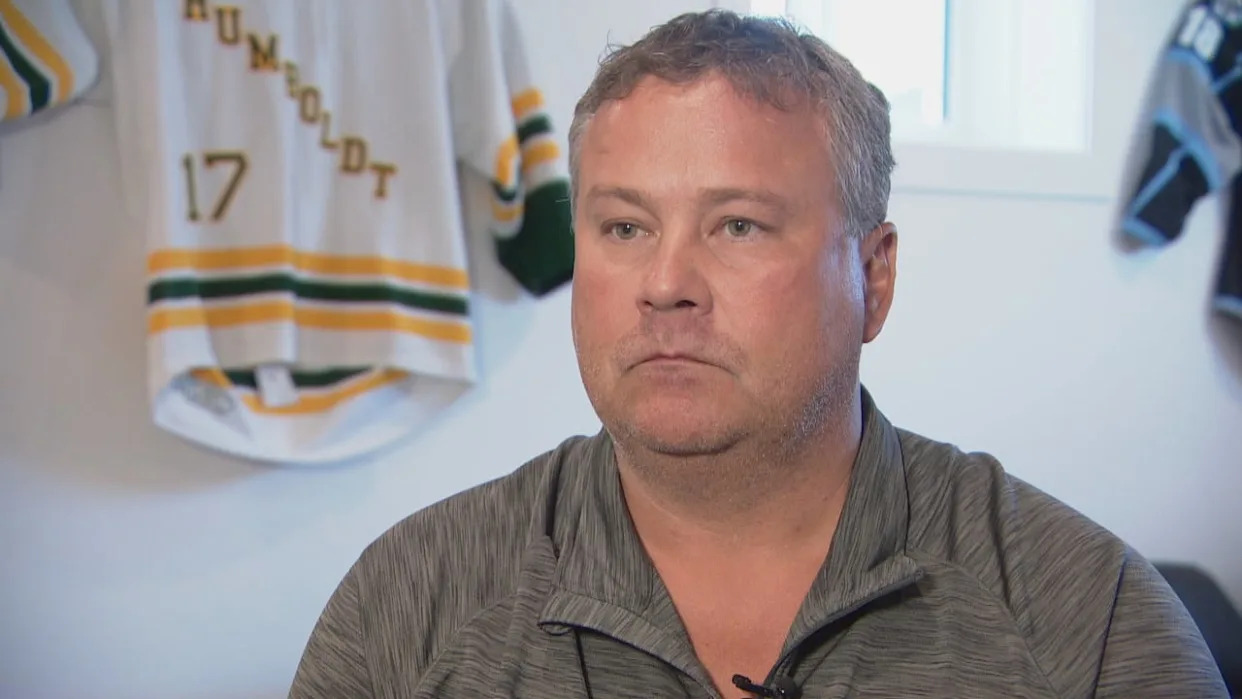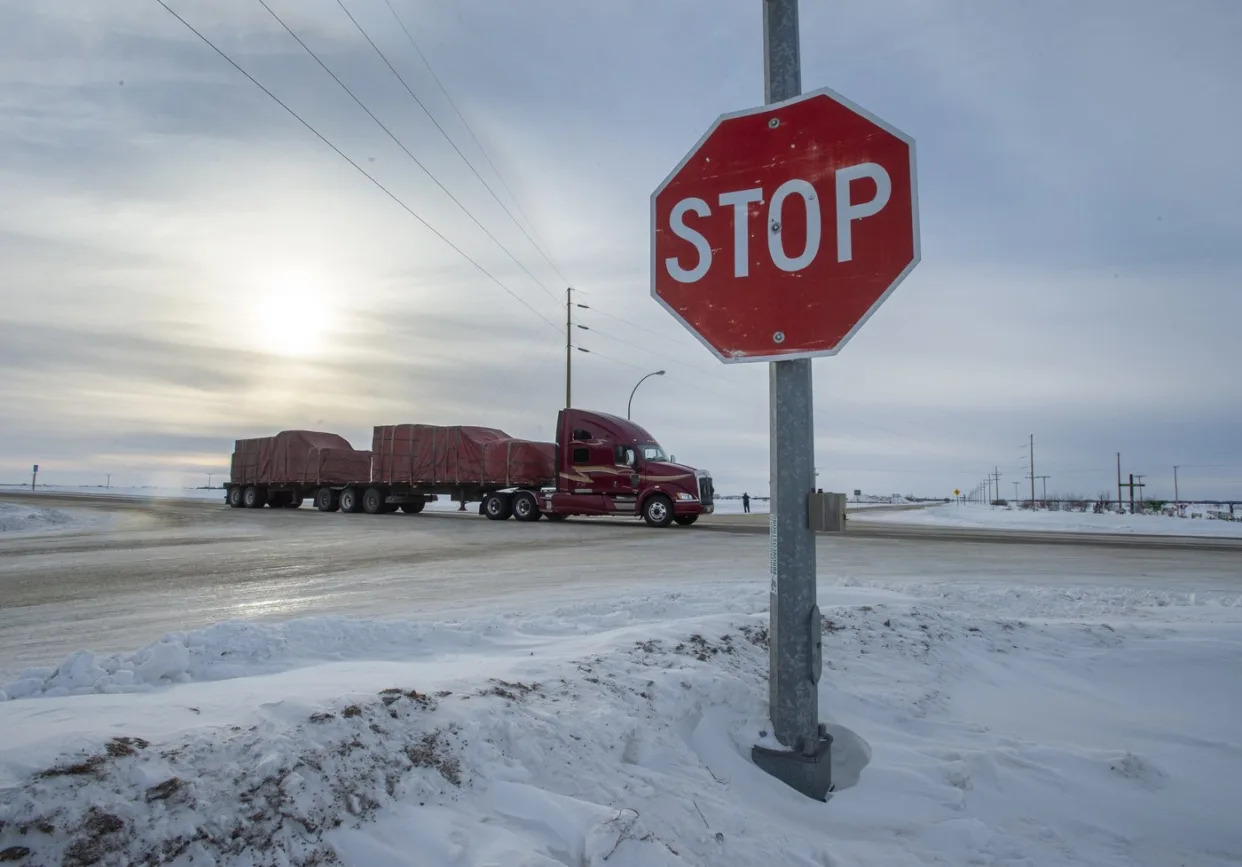Families of Humboldt Broncos crash victims say they're shocked after province relaxes some licensing rules
CBC
Thu, May 30, 2024

Scott Thomas's son, Evan, was killed in 2018 after the Humboldt Broncos junior hockey team's bus collided with a semi truck. He said that he doesn't agree with the changes that have been made to relax licensing regulations for foreign workers in agriculture. (Chanss Lagaden/CBC - image credit)
The father of one of the victims of the 2018 Humboldt Broncos bus crash says he and other families of victims worked for years to get better regulations in place for foreign truckers — and a recent change by the Saskatchewan government is a step backward.
It's "the complete opposite of what we've been mandating for these last five or six years," said Scott Thomas.
His son, Evan Thomas, was among the 16 people killed in the April 6, 2018, crash, when an inexperienced truck driver went through a stop sign at a highway intersection near Tisdale, Sask., and into the path of a bus carrying members of the Humboldt Broncos junior hockey team.
Another 13 people were injured.
In the aftermath of the crash, the provincial government promised to change the rules for foreign workers driving trucks on Saskatchewan roads. They changed them in 2021, prohibiting all non-residents, including foreign workers, from driving on out-of-country Class 1 licences — the type of licence that allows driving a semi.
Now, however, the province has relaxed the rules for temporary foreign workers in the agricultural sector.
Documents obtained by CBC News reveal the province is allowing foreign agriculture workers from 40 countries to drive on their home country's licence for up to a year, until May 21, 2025.
Those countries include several European countries, the United Kingdom, Australia, New Zealand, Portugal and Taiwan.
Dustin Duncan, the minister responsible for Saskatchewan Government Insurance — which handles driver licensing in the province — confirmed the exemption was made to help the agriculture industry, which relies on foreign workers.
He said workers who come to Saskatchewan after working in the agriculture sector in the southern hemisphere don't have enough time to complete mandatory training to get a Saskatchewan Class 1 licence before seeding begins.
To get a Class 1 commercial licence, drivers in the province normally have to complete the more than 120-hour mandatory entry-level training, or MELT, program, which came into effect in 2019.
"We're trying to strike that balance with ensuring that we have a MELT program that is very rigorous, but also trying to balance that off with allowing for temporary foreign workers from a limited number of countries that we have reciprocal licensing agreements with," said Duncan.

Dustin Duncan, the minister responsible for SGI, says the province is trying to balance a 'rigorous' training program with allowing for temporary foreign workers to work in the agriculture sector. (Kirk Fraser/CBC)
But Thomas believes that anybody coming to the province should be held to the same standards.
"I think that opening the door to foreign drivers, just because some government perceived that [they're certified], is not enough. I think that opens a door and becomes a pretty slippery slope," he said.
Thomas said there should have been public consultation before the change was implemented, "whether that's [with] us specifically who lived through tragedies like that, or just the general public — because this is something that affects everybody."
The driver of the truck involved in the Broncos crash, Jaskirat Singh Sidhu, was sentenced to eight years in prison for dangerous driving offences. Last week, the permanent resident was ordered to be deported to India.
'A step back': parent
Carol Brons is the Director of Safer Roads Canada, a non-profit that advocates for changes to Canada's commercial licensing system.
She is also the mother of Dayna Brons, the only woman who died in the Humboldt Broncos crash.
She also said the changes came as a surprise — one she finds concerning and disappointing.
"My biggest concern is that it is kind of a step back, in my eyes. I get that they're trying to bring in more workers because of the need, but at what cost is my question? At what cost to the public safety?" she said.

Carol Brons is the director of Safer Roads Canada. Her daughter, Dayna Brons, was one of the 16 people killed in the 2018 Broncos crash. (Sam Samson/CBC)
Brons said that driving rules and conditions not only vary from one country to another — they're not even the same within Canada.
"I think there should be some training — like mandatory training or testing at least, that they have to pass, or something just to prove that they are capable and prove that they understand the different rules" in Saskatchewan, she said.
She believes the province's changes won't make Saskatchewan roads any safer and could, depending on the driver, possibly make them more dangerous.
Brons thinks Saskatchewan's MELT program is a step in the right direction, but says it's only minimum entry-level training.
"It doesn't give you any real experience of driving the truck or semi-trailer. It doesn't give you any experience necessarily across Canada. For me, a graduated licence would be very important," she said.
Brons also wants to see a national Red Seal licensing system, which would get all jurisdictions to agree on certain regulations and set a standard across the country.
Humboldt Broncos families fight to keep Saskatchewan government named in lawsuit
The Canadian Press
Tue, May 28, 2024

REGINA — Lawyers for several Humboldt Broncos families were in court Tuesday fighting a bid by the government of Saskatchewan to have it removed as a defendant in a lawsuit over the deadly bus crash in 2018.
The five hockey families are suing over the crash, alleging the province knew the rural intersection where the crash happened had problems with visibility but did nothing to fix it.
Sixteen people were killed and 13 were injured when an inexperienced truck driver went through a stop sign and into the path of the junior hockey team's bus at the intersection near Tisdale, Sask.
The government and the truck driver want to have their names struck from the suit.
The suit also names the bus company and the Calgary-based company that employed the truck driver.
The trucker, Jaskirat Singh Sidhu, was sentenced to eight years in prison for dangerous driving offences. Last week, the permanent resident was ordered to be deported to India.
"The government and Mr. Sidhu ... they wish the claim to be struck and for this trial to never occur," lawyer Kevin Mellor told court.
"The facts, as we know, are so brutal we understand why they don't want a trial. But it's our submission today that a trial needs to be heard."
Mellor represents the families of four players — Jaxon Joseph, 20, of St. Albert, Alta.; Logan Hunter, 18, of St. Albert; Jacob Leicht, 19, of Humboldt, Sask.; and Adam Herold, 16, of Montmartre, Sask. — and assistant coach Mark Cross, 27, of Strasbourg, Sask. They were all killed in the crash.
Mellor said it's unconstitutional for the government to try to bar the families from taking the action with all defendants to trial.
He told Court of King's Bench Justice Graeme Mitchell that the government hasn't even filed a statement of defence in the last six years.
In a previous court notice, the government asked to be struck from the suit because Saskatchewan has no-fault insurance. That means a person receives comprehensive benefits no matter who’s responsible for a collision, but the right to sue for pain and suffering is limited.
Mellor said the government has been aware of the problematic intersection of highways 35 and 335 since 1997, when a family of six was killed in a crash there.
Eight months after the Broncos crash, a safety review of the intersection found a stand of trees obstructed the view of drivers. The trees were removed and rumble strips were added.
"If the government had simply designed and constructed and maintained the highway ... the bus would have stopped regardless of what Mr. Sidhu had done ... and the Broncos would have lived," Mellor said.
Lawyers for the province had not yet addressed the hearing, which was scheduled to run until Friday. The judge was expected to reserve his decision.
This report by The Canadian Press was first published May 28, 2024.
— By Bill Graveland in Calgary
The Canadian Press
CBC
Thu, May 30, 2024

Scott Thomas's son, Evan, was killed in 2018 after the Humboldt Broncos junior hockey team's bus collided with a semi truck. He said that he doesn't agree with the changes that have been made to relax licensing regulations for foreign workers in agriculture. (Chanss Lagaden/CBC - image credit)
The father of one of the victims of the 2018 Humboldt Broncos bus crash says he and other families of victims worked for years to get better regulations in place for foreign truckers — and a recent change by the Saskatchewan government is a step backward.
It's "the complete opposite of what we've been mandating for these last five or six years," said Scott Thomas.
His son, Evan Thomas, was among the 16 people killed in the April 6, 2018, crash, when an inexperienced truck driver went through a stop sign at a highway intersection near Tisdale, Sask., and into the path of a bus carrying members of the Humboldt Broncos junior hockey team.
Another 13 people were injured.
In the aftermath of the crash, the provincial government promised to change the rules for foreign workers driving trucks on Saskatchewan roads. They changed them in 2021, prohibiting all non-residents, including foreign workers, from driving on out-of-country Class 1 licences — the type of licence that allows driving a semi.
Now, however, the province has relaxed the rules for temporary foreign workers in the agricultural sector.
Documents obtained by CBC News reveal the province is allowing foreign agriculture workers from 40 countries to drive on their home country's licence for up to a year, until May 21, 2025.
Those countries include several European countries, the United Kingdom, Australia, New Zealand, Portugal and Taiwan.
Dustin Duncan, the minister responsible for Saskatchewan Government Insurance — which handles driver licensing in the province — confirmed the exemption was made to help the agriculture industry, which relies on foreign workers.
He said workers who come to Saskatchewan after working in the agriculture sector in the southern hemisphere don't have enough time to complete mandatory training to get a Saskatchewan Class 1 licence before seeding begins.
To get a Class 1 commercial licence, drivers in the province normally have to complete the more than 120-hour mandatory entry-level training, or MELT, program, which came into effect in 2019.
"We're trying to strike that balance with ensuring that we have a MELT program that is very rigorous, but also trying to balance that off with allowing for temporary foreign workers from a limited number of countries that we have reciprocal licensing agreements with," said Duncan.

Dustin Duncan, the minister responsible for SGI, says the province is trying to balance a 'rigorous' training program with allowing for temporary foreign workers to work in the agriculture sector. (Kirk Fraser/CBC)
But Thomas believes that anybody coming to the province should be held to the same standards.
"I think that opening the door to foreign drivers, just because some government perceived that [they're certified], is not enough. I think that opens a door and becomes a pretty slippery slope," he said.
Thomas said there should have been public consultation before the change was implemented, "whether that's [with] us specifically who lived through tragedies like that, or just the general public — because this is something that affects everybody."
The driver of the truck involved in the Broncos crash, Jaskirat Singh Sidhu, was sentenced to eight years in prison for dangerous driving offences. Last week, the permanent resident was ordered to be deported to India.
'A step back': parent
Carol Brons is the Director of Safer Roads Canada, a non-profit that advocates for changes to Canada's commercial licensing system.
She is also the mother of Dayna Brons, the only woman who died in the Humboldt Broncos crash.
She also said the changes came as a surprise — one she finds concerning and disappointing.
"My biggest concern is that it is kind of a step back, in my eyes. I get that they're trying to bring in more workers because of the need, but at what cost is my question? At what cost to the public safety?" she said.

Carol Brons is the director of Safer Roads Canada. Her daughter, Dayna Brons, was one of the 16 people killed in the 2018 Broncos crash. (Sam Samson/CBC)
Brons said that driving rules and conditions not only vary from one country to another — they're not even the same within Canada.
"I think there should be some training — like mandatory training or testing at least, that they have to pass, or something just to prove that they are capable and prove that they understand the different rules" in Saskatchewan, she said.
She believes the province's changes won't make Saskatchewan roads any safer and could, depending on the driver, possibly make them more dangerous.
Brons thinks Saskatchewan's MELT program is a step in the right direction, but says it's only minimum entry-level training.
"It doesn't give you any real experience of driving the truck or semi-trailer. It doesn't give you any experience necessarily across Canada. For me, a graduated licence would be very important," she said.
Brons also wants to see a national Red Seal licensing system, which would get all jurisdictions to agree on certain regulations and set a standard across the country.
Humboldt Broncos families fight to keep Saskatchewan government named in lawsuit
The Canadian Press
Tue, May 28, 2024

REGINA — Lawyers for several Humboldt Broncos families were in court Tuesday fighting a bid by the government of Saskatchewan to have it removed as a defendant in a lawsuit over the deadly bus crash in 2018.
The five hockey families are suing over the crash, alleging the province knew the rural intersection where the crash happened had problems with visibility but did nothing to fix it.
Sixteen people were killed and 13 were injured when an inexperienced truck driver went through a stop sign and into the path of the junior hockey team's bus at the intersection near Tisdale, Sask.
The government and the truck driver want to have their names struck from the suit.
The suit also names the bus company and the Calgary-based company that employed the truck driver.
The trucker, Jaskirat Singh Sidhu, was sentenced to eight years in prison for dangerous driving offences. Last week, the permanent resident was ordered to be deported to India.
"The government and Mr. Sidhu ... they wish the claim to be struck and for this trial to never occur," lawyer Kevin Mellor told court.
"The facts, as we know, are so brutal we understand why they don't want a trial. But it's our submission today that a trial needs to be heard."
Mellor represents the families of four players — Jaxon Joseph, 20, of St. Albert, Alta.; Logan Hunter, 18, of St. Albert; Jacob Leicht, 19, of Humboldt, Sask.; and Adam Herold, 16, of Montmartre, Sask. — and assistant coach Mark Cross, 27, of Strasbourg, Sask. They were all killed in the crash.
Mellor said it's unconstitutional for the government to try to bar the families from taking the action with all defendants to trial.
He told Court of King's Bench Justice Graeme Mitchell that the government hasn't even filed a statement of defence in the last six years.
In a previous court notice, the government asked to be struck from the suit because Saskatchewan has no-fault insurance. That means a person receives comprehensive benefits no matter who’s responsible for a collision, but the right to sue for pain and suffering is limited.
Mellor said the government has been aware of the problematic intersection of highways 35 and 335 since 1997, when a family of six was killed in a crash there.
Eight months after the Broncos crash, a safety review of the intersection found a stand of trees obstructed the view of drivers. The trees were removed and rumble strips were added.
"If the government had simply designed and constructed and maintained the highway ... the bus would have stopped regardless of what Mr. Sidhu had done ... and the Broncos would have lived," Mellor said.
Lawyers for the province had not yet addressed the hearing, which was scheduled to run until Friday. The judge was expected to reserve his decision.
This report by The Canadian Press was first published May 28, 2024.
— By Bill Graveland in Calgary
The Canadian Press
No comments:
Post a Comment